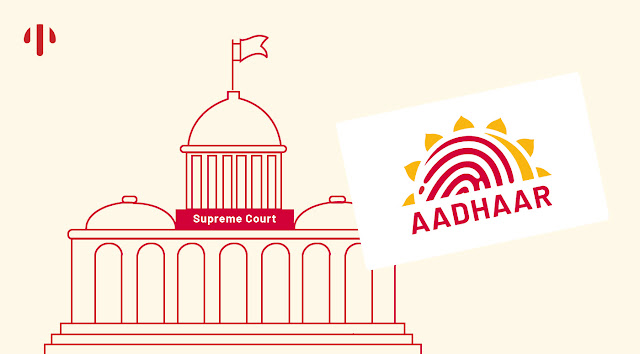Supreme Court Ruling on Aadhar
In September 2018, the supreme court passed a historical judgement
which modified several terms of the Aadhar card. The unmodified terms
could potentially violate the privacy of Indian citizens.
The five-member bench delivered a majority judgment. The bench pronounced three sentences.
2) It is no longer necessary for citizens to link their bank accounts and mobile numbers with Aadhaar.
3) If children cannot provide an Aadhar card they cannot be denied the benefits of any scheme and that schools cannot compel parents to submit Aadhaar numbers of their offsprings during admission.
Likewise, the ruling prohibits the government from linking Aadhaar with exams conducted by the CBSE, NEET, and the UGC. The order also bans private organisations from requesting and accumulating Aadhaar details of their workers.
6) The court has barred the government from assigning Aadhar cards to unauthorised immigrants.
7) The majority verdict maintained that the Aadhaar Act does not infringe the right to privacy of an individual.
10) Justice DY Chandrachud, the only judge who wrote a dissenting judgment, said the Aadhaar scheme in its whole is undemocratic. Also, he mentions that UIDAI cannot use the rights of 1.2 billion Indian citizens as a mere contract. He said that the Parliament was incorrect in passing the Aadhaar Act as a money bill.
11) Justice Chandrachud said many terms of the Aadhaar Act provide for the invasive collection of biometric data. He further argues about the transparency of the outcome in case of bio metric data mismatch.
Supreme Court has observed that the Aadhar Card in India or UID does not create a state of surveillance nor does it breaks the right to privacy. A declaration was made by the Supreme Court of India that though the biometric project was constitutionally valid, it had scope limitations. Which churned out a decision that the Aadhar Card is not mandatory for the mobile connections, banking and admissions in educational institutions.
The five-member bench delivered a majority judgment. The bench pronounced three sentences.
Important Takeaways From the Supreme Court Ruling:
1) The Supreme Court judgement states that no individual’s rights can be dismissed on the grounds of lack of possessing an Aadhar card.2) It is no longer necessary for citizens to link their bank accounts and mobile numbers with Aadhaar.
3) If children cannot provide an Aadhar card they cannot be denied the benefits of any scheme and that schools cannot compel parents to submit Aadhaar numbers of their offsprings during admission.
Likewise, the ruling prohibits the government from linking Aadhaar with exams conducted by the CBSE, NEET, and the UGC. The order also bans private organisations from requesting and accumulating Aadhaar details of their workers.
4) Aadhar card will continue to be compulsory for filing of income tax returns and allocation of Permanent Account Number (PAN).
5) The marginalised sections of society benefit from the Aadhar card as it provides them with an identity states the Supreme court ruling, furthermore, it also mentions that Aadhaar is serving a much bigger public interest.6) The court has barred the government from assigning Aadhar cards to unauthorised immigrants.
7) The majority verdict maintained that the Aadhaar Act does not infringe the right to privacy of an individual.
8) Justice Sikri one of the judges of the 5-member bench, ruled out the probability of people getting duplicate Aadhaar card. He said that there is a satisfactory defense mechanism to guarantee that the Aadhaar scheme is genuine.
9) The Supreme Court ruling removed the provision in the Aadhaar Act that permitted the sharing of information on the grounds of national security. The court ordered the government to bring in a robust law for information protection at the earliest.10) Justice DY Chandrachud, the only judge who wrote a dissenting judgment, said the Aadhaar scheme in its whole is undemocratic. Also, he mentions that UIDAI cannot use the rights of 1.2 billion Indian citizens as a mere contract. He said that the Parliament was incorrect in passing the Aadhaar Act as a money bill.
11) Justice Chandrachud said many terms of the Aadhaar Act provide for the invasive collection of biometric data. He further argues about the transparency of the outcome in case of bio metric data mismatch.
Major Outcome by Supreme Court Ruling on Right to Privacy:
Supreme Court has mentioned that it is not mandatory to link your Aadhar Card with your phone number and bank account but it is mandatory for linking PAN. It has directed the Center to conduct Data Protection Law.Supreme Court has observed that the Aadhar Card in India or UID does not create a state of surveillance nor does it breaks the right to privacy. A declaration was made by the Supreme Court of India that though the biometric project was constitutionally valid, it had scope limitations. Which churned out a decision that the Aadhar Card is not mandatory for the mobile connections, banking and admissions in educational institutions.




Comments
Post a Comment